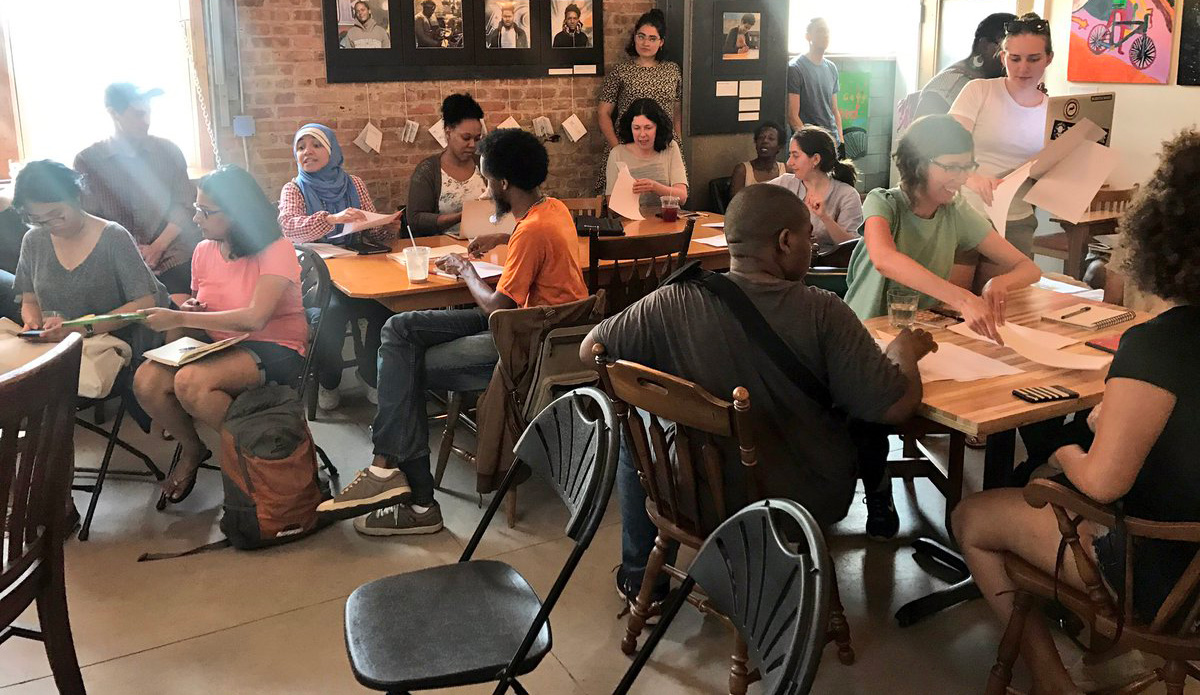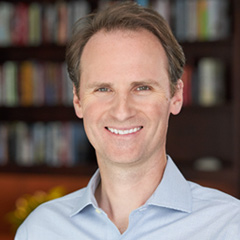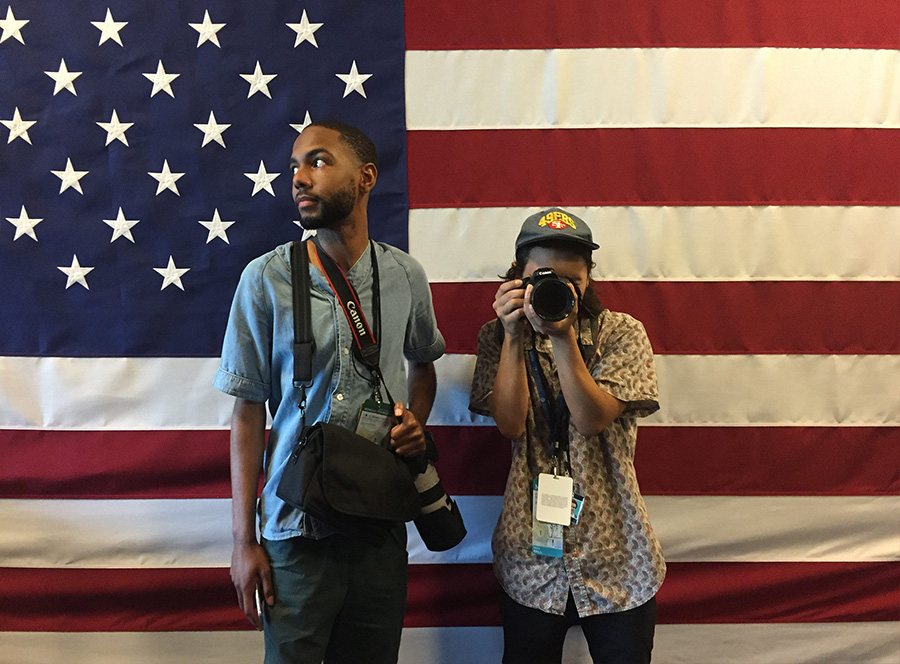

Essay by John Palfrey, President
June 22, 2023
Not everything that is faced can be changed, but nothing can be changed until it is faced.
Introduction
At the height of the pandemic and racial reckoning, this timeless James Baldwin quote became ubiquitous on social media as people searched for hope amid formidable challenges and uncertainty.
It was unclear whether the actions we were taking to protect our health, safety, and well-being would work. Coupled with that was resistance to changing our ways of life to make a better future possible for all. Baldwin’s words remain resonant because they motivated us to overcome the pervasive inadequacy we were experiencing and called on the unwilling to try.
At the MacArthur Foundation, we pursue our mission to foster a more just, verdant, and peaceful world with the spirit of Baldwin’s message in mind. We address the biggest challenges of our time with our whole hearts and minds—from climate change to criminal justice—striving for transformative change with the communities we serve. We also recognize that new challenges, strategies, and knowledge are bound to emerge. We stand committed to ensuring our priorities are responsive to evolving conditions, remaining consistently flexible, and bringing confident humility to our approaches.
To that end, change is around the corner at MacArthur. Seven years after we launched our initial time-limited Big Bets to support the creation of solutions to era-defining challenges, we are approaching the planned conclusion of each of the grantmaking strategies we chose at the outset of this endeavor. Over the next four years, we will bring to a close our strategies in Nuclear Challenges (2023), On Nigeria (2024), Criminal Justice (2025), and Climate Solutions (2026). We deeply appreciate the progress grantees of our current Big Bets have made towards profound areas of concern, celebrate the places where we and our partners have met and exceeded our goals together, and value our learning where we have not.
Exploring New Work
We are winding down our current Big Bets strategies with our eyes wide open to the fact that crises such as climate change, nuclear risk, government corruption, and overincarceration persist, and we will develop new work or new strategies to respond to these or other persistent challenges, guided by our mission. The process for selecting new work will be collaborative and participatory and composed of the following four phases.
The first phase of our new work selection process includes sourcing and generating ideas from our Staff and Board about what to fund, and new ways to fund, on a regular basis.
The second phase is exploratory and includes research, outreach, consultations, and grantmaking. During this phase we are building relationships and learning about trends, challenges, and promising strategies for potential new work.
We want to ensure our new work aligns with our values and mission.
Following exploration, we plan to experiment with the ideas selected. As we determine whether the new area of work is a good fit for the Foundation, we are trying different grantmaking approaches, assessing their feasibility and durability, and developing potential strategies.
The final phase involves formally selecting an area of work that has passed through the previous three phases to become a new MacArthur program.
Throughout it all we are maintaining a few working assumptions to guide our thinking and selection process. We will not reinstate program strategies that have ended, but we will leverage our assets, networks, and lessons learned.
Our Board has expressed an interest in identifying work that is ambitious, bold, creative, and strategic. We want to ensure our new work aligns with our values and mission by creating more resilient, inclusive communities to combat structural racism and inequality.
Catalyzing a Local News Renaissance
As our process to evolve our programmatic work continues, we remain optimistic about the impact we can generate with the communities we serve through a range of tools and grantmaking.
We are particularly excited to consider an area that has been important to us since the early stages of our Foundation—journalism and media.

YR Media, a Journalism and Media Program grantee, is a national youth-driven media production company that trains hundreds of young people each year on how to use journalism and storytelling for social change.
Our Journalism and Media Program is one of MacArthur’s two Enduring Commitments. We continue to believe deeply in the work we fund to strengthen democracy and build a more equitable future by informing, engaging, and activating Americans through investments in just and inclusive news and narratives.
We have largely been national funders in the field. In that role, we have seen the community impact of local outlets and the obstacles local news faces. For much of the last year, we have been in intense investigation and wide-ranging consultation with practitioners and funders across the journalism and media field about the revitalization of local news.
We know that local news meets local needs, but it also has national implications. It has more direct relevance and is often more trusted than the big national news outlets. And local news often brings people together with shared interests—from sports and weather to community meetings and cultural events. People have to be accurately informed about what is happening in their communities and the potential impact on their well-being, so they can be the best advocates for their information needs.
Local news often brings people together with shared interests.
The steady and significant decline in the availability of reliable, fact-based local news across the country is contributing to growing threats to democracy, increasing polarization, and the spread of disinformation.
Philanthropy has a unique role to play by re-centering local journalism as a force for community cohesion, civic participation, and government accountability.
Meanwhile, journalism has never been a philanthropic imperative, in the same way that education and health care have been, and criminal justice reform and climate change have now become. Over the past 15 years, there has been a steady growth in journalism funding, but overall giving has not kept pace with the seriousness of the problem. And yet the philanthropic sector recognizes the urgency of addressing the growing crises for American democracy and is beginning to see that progress on every other issue is dependent on the public’s understanding of the facts.
Our Local News Crisis
It is no coincidence Americans believe that people in different political parties cannot agree on basic facts. Too many people lack access to accurate, consequential information they need to make good decisions for themselves and their families. We get news from an information environment that is exacerbating our disagreements. We have vastly different media diets, fed largely by national left-leaning and right-leaning outlets and social media that reinforce our points of view and perspectives.
Among the many challenges facing American democracy, from low voter turnout and declining civic engagement to increasing partisanship and disagreement on facts and science, there is one thing that is inextricably connected to these and other problems: the steady disappearance of local news.
One-fifth of Americans live in news deserts, and tens of millions more live in communities at risk of losing their last reliable local news resource. Since 2005, the United States has lost more than one-fourth of its newspapers and is on track to lose one-third by 2025. The news industry has lost 30,000 jobs since 2008.
One-fifth of Americans live in news deserts.
This problem is particularly urgent in the South, Southeast, and the middle of the country, and in communities where the poverty rate is higher than the national average and the median income is lower than the national average, making the lack of access to fact-based journalism and reliable information yet another indicator of growing income inequality.
There is also an imbalance in who gets to cover the news and shape narratives.
For historically marginalized communities, including people of color, people with disabilities, and the LGBTQ+ community, the news media has never done an adequate job of representing them or their interests—neither inside the newsroom nor in news coverage. One contributing factor may be that newsrooms have not reflected the diversity of the American population; the proportion of White people in newsrooms is higher than the share of U.S. workers overall who are White. Consequently, trust in media by historically marginalized communities, and the general population, is alarmingly low.
As we witnessed when the global pandemic set in, an already frail for-profit journalism industry contracted further, leaving public and nonprofit media to fill the void. Community-serving outlets continued to serve as trusted sources for accurate and culturally competent news and information. Their primary purpose was to do right by their communities, leading them to be among the most effective in holding local government accountable by creating more accurate and just news and narratives about the lived experiences and realities of communities most impacted by COVID-19.
Reimagining and Revitalizing Local News
If we face our local news crisis head-on, there is ample reason to be optimistic about where the news and media field is headed. Promising changes abound, led by a new, more entrepreneurial generation of leaders that is redefining the news and media landscape, using smarter tools and better infrastructure to support audience engagement and generate revenue. These leaders are meeting the information needs of communities by adopting bold approaches and collaborations. They need help from philanthropy to bolster the hard work they have put into reversing the journalism sector’s 15-year decline.
At MacArthur, we have heard as much from many grantees and partners in the field, given their feedback serious consideration, and supported inclusive research efforts and convenings to identify solutions to the ongoing local journalism crisis. We have encouraged other funders to join us in looking at the field afresh. And we have been equally encouraged to join existing efforts, such as More Perfect, a bipartisan initiative that is advancing five democracy goals, including Bridging Divides and Access to Trusted News and Information.
Inspired by the more than a year of input and feedback from the field, MacArthur is considering how we can support the reimagination, revitalization, and rapid development of the local news ecosystem in the United States.
Our highest hope is to catalyze a local news renaissance that will reshape the local news landscape.
Our support will center around what we are calling “five Ds”: media initiatives that bolster democracy at the local level; support greater diversity in staff and coverage; are digital in orientation; develop long-term sustainable models; and drive demand for high quality local news and information necessary for every member of every community to thrive.
Our highest hope is to catalyze a local news renaissance that will reshape the local news landscape. We envision raising significant new resources for local news and proposing an ambitious and collaborative undertaking grounded in a set of shared goals and values.
A group of other funders—national and regional, long-time journalism funders, and funders new to the field—have rallied to the cause. Together, we hope to:
- Scale innovations and interventions that have limited reach today and bring those ideas and practices to more parts of the country;
- Catalyze greater philanthropic attention, interest, and investment, particularly by regional and local donors who ultimately become part of the sustaining revenue mix for local journalism;
- Jumpstart funder-to-funder and funder-to-grantseeker coordination and collaboration that create economies of scale, lower transaction costs, accelerate progress and impact, and attract more support; and
- Seed and advance local and state public policy ideas and interventions that provide long lasting support for local journalism.
Accelerating a Transformation in Journalism
The philanthropic sector recognizes the urgency of addressing the growing crises for American democracy and is beginning to see that progress on every other issue, from climate change and healthcare to criminal justice reform and racial equity, is dependent on the public’s understanding of the facts.
Our sector has invested in a decade of experimentation to develop new models and solutions to revitalize public service journalism. It is time to move from experimentation to expansion, from individual grantmaking strategies to a shared vision and coordinated action.
At MacArthur, we seek to engage in a national effort to expand local journalism at an unprecedented scale. We see great value in working with trusted partners in deep collaboration. We realize it is not enough to have an idea, we know how much more we can do when we work in true partnership with others.
We are excited to share further details about our plans in the coming months, and because we know the sum is greater than any one of its parts, we look forward to welcoming all interested funder partners to join us in this critical new endeavor.
Stronger journalism for a stronger democracy is in sight if we can accelerate the transformation underway.

I invite your comments, suggestions, and critique, with special appreciation for a candor that will challenge us to achieve greater clarity, humility, wisdom, and impact.
Please Share Your CommentsMore Annual Essays
Imagining a Better Future Together
Imagining a Better Future Together
Essay by John Palfrey, President


